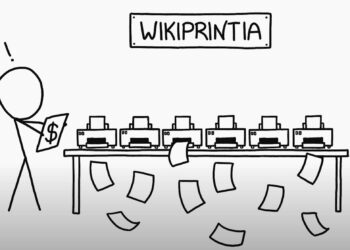
Image via Wikipedia
The travails of the music industry have been applied and misapplied to scholarly publishing as the digital age has emerged. One true but still unheeded lesson is that locking value to a fixed medium — even a Web site — will have limited success (not none, but limited). However, a recent lesson learned by Atlantic Records (as reported in the New York Times) holds what I think will be a new and true lesson for scholarly publishers — the elimination of waste will look like the pie is shrinking.
Atlantic Records has become the first major label to generate the majority of its revenues from digital sources:
With the milestone comes a sobering reality already familiar to newspapers and television producers. While digital delivery is becoming a bigger slice of the pie, the overall pie is shrinking fast. Analysts at Forrester Research estimate that music sales in the United States will decline to $9.2 billion in 2013, from $10.1 billion this year. That compares with $14.6 billion in 1999, according to the Recording Industry Association of America.
Atlantic Records says that while it has achieved this ratio, its CD sales have not declined as quickly as the overall market.
Note that it’s a difference in rate, not direction. CD sales are tanking. And that’s where the elimination of waste comes in. (By the way, I don’t buy the digital piracy explanation — the cassette was an excellent and widespread music-sharing [aka, piracy] medium, and I find it’s much harder nowadays to find pirated music online than it was to get a friend to put a couple of albums on a 90-minute cassette.)
In the CD era of music, the only way to get a song you liked was to buy the entire CD. There was no real equivalent of the 45 single of the LP era. Buying all those extra songs meant waste — wasted money for the consumer. Maybe some of the other songs were also good, but usually the extra $10 and 10 songs constituted waste.
Except for the recording industry. It represented pie. Delicious, wholesome financial pie.
Now, purchasing a digital download allows multiple behaviors that were not available before:
- Listening to a 30-second sample to determine if you really want to spend the money
- Putting the music in your shopping cart and thinking about buying it while you go off to spend time doing something else
- Buying one song and returning to buy the rest of the album if you choose, or maybe just 1-2 more songs
From a consumer’s perspective, the pie of the CD era was full of waste — songs purchased on fixed media because there was no other choice, which artificially inflated revenues beyond true demand.
Now, demand and supply are more accurately calibrated, and the recording industry’s pie seems to be shrinking. But consumers are getting what they want.
There is waste in scholarly publishing business models, from site licenses that amount to fixed digital goods to print issues, and the ability for users to eliminate waste from their purchasing decisions is limited.
Will it remain this way forever? Or has it already changed?
Discussion
1 Thought on "Shrinking Pie = Lost Waste"
I like the analogy to the music industry where authors, subscriptions, and publishers could be thought of as artists, albums, and record labels.
On the other hand, there are fundamental differences between the scholarly and music industries that should be pointed out:
1) Authors are not paid directly for their work but are remunerated indirectly through the reputation they build by giving their intellectual content away for free.
2) The vast majority of readers do not pay directly for what they read. While faculty, students, and researchers are effectively taxed to provide funds for library subscriptions, they do not pay them directly out of pocket. For all intents and purposes, articles are free to them.
3) Libraries are not profit-making or even cost-recovery centers. They work on fixed budgets and aim to pay every last penny in their annual budgets or risk having some taken away in future years. Minimizing expenditures is not a financial goal of the academic library.
As a result, it makes perfect (and rational) sense for a subscription market to continue in spite of its “wastefulness.”
An iTunes model where articles are purchased by the drink does have a small niche market for industry and corporate libraries. Most academic institutions seem to be quite happy (if happy can be equated with persistence) with the subscription model, with interlibrary loan analogous to your copying albums on cassette tapes.
![Reblog this post [with Zemanta]](http://img.zemanta.com/reblog_e.png?x-id=e4c5651e-e107-4257-b97f-0c3eb4751dd0)


